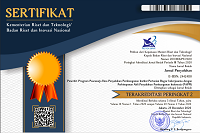PENGARUH BAHASA BOOKLET PADA PENINGKATAN PENGETAHUAN PETERNAK SAPI PERAH TENTANG INSEMINASI BUATAN DI KELURAHAN NONGKOSAWIT, KECAMATAN GUNUNGPATI, KOTA SEMARANG
Keywords:
Booklet, Javanese, Bahasa Indonesia
Abstract
A research concerning the effect of booklet’s language on the dairy farmers knowledge gain regarding artificial insemination had been accomplished in Nongkosawit Village, Gunung Pati District, City of Semarang on April 3 to June 3, 2004. The objective of the research was to determine whether such an extension booklet language created an effect on the dairy farmers’ knowledge regarding artificial insemination. Fourty dairy farmers were selected purposively for this research. They were divided into two groups, with 20 members each. The first group was exposed to the first version of the booklet written Javanese, and the second group was exposed to the second version of the booklet written in bahasa Indonesia. One-way analysis of variance was used to analyze the data collected. The results pointed out that the effect of the booklets’ languages on the dairy farmers’ knowledge gains about artificial insemination was not significant at alpha equal to 0.05.Downloads
Published
2006-06-01
How to Cite
SatmokoS., & AstutiH. T. (2006). PENGARUH BAHASA BOOKLET PADA PENINGKATAN PENGETAHUAN PETERNAK SAPI PERAH TENTANG INSEMINASI BUATAN DI KELURAHAN NONGKOSAWIT, KECAMATAN GUNUNGPATI, KOTA SEMARANG. Jurnal Penyuluhan, 2(2). https://doi.org/10.25015/penyuluhan.v2i2.2184
Section
Articles
Authors who publish with this journal agree to the following terms:
- Authors retain copyright and grant the journal right of first publication with the work simultaneously licensed under a

This work is licensed under a Creative Commons Attribution 4.0 International License that allows others to share the work with an acknowledgement of the work's authorship and initial publication in this journal. - Authors are able to enter into separate, additional contractual arrangements for the non-exclusive distribution of the journal's published version of the work (e.g., post it to an institutional repository or publish it in a book), with an acknowledgement of its initial publication in this journal.
- Authors are permitted and encouraged to post their work online (e.g., in institutional repositories or on their website) prior to and during the submission process, as it can lead to productive exchanges, as well as earlier and greater citation of published work (See The Effect of Open Access).















